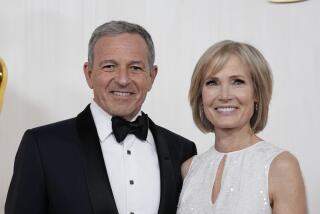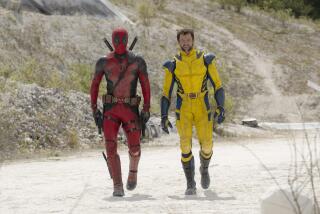Marvel makes for mightier Mouse
- Share via
Mickey Mouse is bringing in some muscle.
Significantly beefing up its stable of characters, Walt Disney Co. announced Monday that it had reached a deal to acquire Marvel Entertainment Inc., the comic book company whose superheroes have become Hollywood blockbusters, for $4 billion in cash and stock.
The acquisition hands Disney a treasure trove of pop culture figures, including Spider-Man, the X-Men, Iron Man, the Hulk, Captain America, Thor and the Fantastic Four, among a roster of 5,000 that it hopes will inspire countless movies, television shows and video games.
In recent years a risk-averse Hollywood has become increasingly reliant upon comic book-based stories that appeal to an established -- and heavily male -- fan base. With Marvel, Disney gets one of the heaviest-hitting creators of superheroes.
Marvel, despite its rich library of characters, has limited experience making its own movies. Until it produced last year’s “Iron Man,” the company licensed its characters to other studios. But Disney is betting that with Marvel it acquires the kind of brand-name recognition it gained when it bought Pixar Animation Studios in 2006, especially among teens and young adults, who are the core drivers of the box office. That’s an audience segment Disney has struggled to attract, as it has been more successful with families.
“They’ve shown a tremendous skill at increasing the commercial appeal of characters like Iron Man that traditionally weren’t well known outside of Marvel’s core fan community,” said Disney President and Chief Executive Robert A. Iger. “And we believe there’s further opportunity to mine Marvel’s rich intellectual property portfolio.”
To be sure, Disney isn’t the first studio to discover the power of Marvel comics.
Many of the best-known members of the publisher’s muscle-bound lineup are locked up in deals with other movie studios. Sony Pictures owns the big-screen rights to Spider-Man in perpetuity, as does 20th Century Fox for the X-Men, the Fantastic Four and Daredevil. Paramount Pictures will distribute five upcoming films set to be financed by Marvel, including “Iron Man 2,” “Thor” and “The First Avenger: Captain America.”
Even though Disney will not control those movies, it will reap some of the proceeds. Disney also will control much of the related merchandising, often a major profit source for motion pictures. And it will be able to create movies, TV shows and video games based on Marvel’s other characters.
Gareb Shamus, chief executive of Wizard Entertainment, which publishes a leading magazine following the comic book industry, thinks Hollywood has barely scratched the surface of Marvel’s roster. Lesser-known characters that could make the leap off the comic book page include the crime-fighting duo Cloak and Dagger, underwater hero Namor the Sub-Mariner, incredibly strong She-Hulk and teenage super group the New Mutants.
Heroes can be many places at once
“There are so many characters and sub-characters that have not been exploited in any way, shape or form,” Shamus said. “So if Disney decides it wants to do a horror line or a supernatural line -- or anything else, for that matter -- there are characters for virtually all those themes in the Marvel library. Disney can say, ‘We don’t have to reinvent it. Let’s take something we already own.’ ”
Disney has several outlets suited for superheroes, including a boy-focused cable network, Disney XD, which already carries 20 hours of programming based on Marvel’s characters. The Burbank media giant operates theme parks on three continents, where it can create rides or attractions based on Marvel’s mythology; a consumer products group with ties to the world’s largest retailers; and an interactive unit that creates games and online communities.
“Now you have one of the most fantastic distribution systems on Earth that’s going to take [Marvel’s] universe and roll it out in such a way that we’re going to have a cosmic soap opera across every conceivable media platform,” said Jeff Gomez, chief executive of Starlight Runner Entertainment, a New York consulting firm that has done work for Disney.
But with so many of Marvel’s characters already committed to other studios -- and theme park competitor Universal Studios, which operates the Marvel Super Hero Island attraction in Orlando, Fla. -- it’s unclear which superheroes Disney will be able to use. Moreover, some devotees of comics’ violent and often dark world are already expressing trepidation about Marvel’s impending takeover by a company so closely associated with princesses and fairies.
“Would Disney start overseeing the comic book production too? Would a Disney representative be in charge of ‘editorial policy’?” wrote one poster to an online forum for the Comics Buyers Guide, a popular fan magazine. “Just picture a writers’ meeting: ‘You can’t go around having the Punisher kill all these people!’ ”
Analysts think that’s unlikely. Christopher Vollmer, head of the media and entertainment practice for consulting firm Booz & Co., noted that Disney has managed to preserve the culture and autonomy of Pixar. With that acquisition three years ago, Disney took over the leader in computer animation and creator of such successful films as “Toy Story” and “Cars,” and brought in its creative guru John Lasseter, who has worked to revive Disney’s storied but stumbling animation group.
The origins of the deal
It has been no secret in Hollywood that Marvel has been available to be acquired at the right price for years. Indeed, Disney considered buying the comic book company a decade ago, according to Dark Horse comics founder Mike Richardson, who was involved in the discussions.
This summer, Iger approached Marvel Chief Executive Ike Perlmutter about a potential combination. Iger said in an interview with The Times that he had been looking at the comic book publisher and movie studio for quite a while, admiring the way its executives managed the company from a creative and business perspective. The two men met in Perlmutter’s office in New York in June to discuss a possible deal and concluded negotiations over the weekend, Iger said.
“It’s obviously a company that feels very familiar to us,” Iger said. “It’s about characters and stories and a brand, and using them in so many compelling ways, from games to all sorts of consumer products to film and television.”
Iger said the combination is “a perfect fit” with Disney, complementing its characters and stories with narratives that reach a different demographic. The acquisition could also help Disney’s film studio, which despite its deft handling of the “Pirates of the Caribbean” franchise has never been able to develop a spandex-clad answer to movies such as Warner Bros.’ “Batman” series.
“We think Marvel’s library and brands are a solid strategic fit for Disney,” Barclays Capital analyst Anthony DiClemente wrote Monday in a note to investors. “Disney should be able to leverage its global reach, execution and distribution capabilities to grow Marvel’s brands and business opportunities.”
Iger said the deal was already fanning creative sparks. Marvel’s creative heads and Disney’s Lasseter got together recently and discussed potential opportunities, he said.
“The group got pretty excited very fast,” Iger told analysts Monday morning. “I almost felt like saying, ‘OK, guys, you have to slow down. We haven’t done this deal yet.’ ”
Marvel shareholders will receive $30 cash plus 0.745 of a Disney share for every Marvel share they own. That values each Marvel share at $50, based on Friday’s closing stock prices. Disney plans to issue 59 million shares by the end of 2010 as part of the transaction.
Marvel shares jumped $9.72, or 25%, to $48.37 in trading Monday. Disney shares fell 80 cents, or nearly 3%, to close at $26.04 but rose 29 cents in after-hours trading.
Disney said the boards of both companies have approved the transaction, but it will require an antitrust review and the approval of Marvel shareholders.
--
More to Read
The biggest entertainment stories
Get our big stories about Hollywood, film, television, music, arts, culture and more right in your inbox as soon as they publish.
You may occasionally receive promotional content from the Los Angeles Times.










